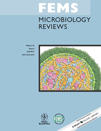
FEMS MICROBIOLOGY REVIEWS
Scope & Guideline
Fostering a Deeper Understanding of Microbial Dynamics
Introduction
Aims and Scopes
- Microbial Pathogenesis and Host Interactions:
Research on how microorganisms interact with their hosts, including mechanisms of infection, immune evasion, and the consequences of these interactions on health and disease. - Ecological and Evolutionary Perspectives:
Studies examining the ecological roles of microbes in various environments, their evolutionary adaptations, and their interactions within microbial communities. - Innovative Methodologies in Microbiology:
The journal emphasizes novel techniques and approaches for studying microbial behavior, such as advanced imaging, genomic sequencing, and bioinformatics tools. - Antimicrobial Resistance and Therapeutics:
Research focused on understanding the mechanisms of antimicrobial resistance in bacteria and the development of new therapeutic strategies. - Microbiome Research:
Investigations into the composition and function of microbiomes across different environments, including human health, agriculture, and ecosystems.
Trending and Emerging
- Host-Microbiome Interactions:
Increasing focus on the complex relationships between hosts and their microbiomes, particularly in health and disease contexts, as researchers explore how these interactions influence immune responses and disease outcomes. - CRISPR and Genetic Engineering Technologies:
A notable rise in studies utilizing CRISPR-based techniques and other genetic engineering approaches, highlighting their potential for high-throughput genomics and novel therapeutic applications. - Environmental Microbiology and Climate Change:
Growing interest in the role of microorganisms in environmental processes and their responses to climate change, including studies on microbial communities in extreme environments. - Microbial Ecology in Health Applications:
Emerging research on the applications of microbial ecology in health, including the therapeutic potential of probiotics and the role of gut microbiota in various diseases. - Synthetic Biology and Microbial Engineering:
An increasing trend towards synthetic biology, where researchers are engineering microbial systems for biotechnological applications, including bioremediation and biofuel production.
Declining or Waning
- Traditional Antibiotic Discovery:
Research focused solely on traditional antibiotic discovery methods appears to be waning, possibly due to the emergence of new approaches such as phage therapy and alternative antimicrobials. - Basic Microbial Physiology Studies:
There seems to be a decline in publications dedicated to fundamental studies of microbial physiology, as the focus shifts towards more applied research and ecological interactions. - Single-Organism Studies:
Research centered on individual microbial species without considering their ecological contexts is becoming less common, indicating a trend towards more integrative approaches.
Similar Journals
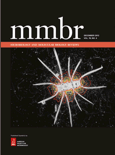
MICROBIOLOGY AND MOLECULAR BIOLOGY REVIEWS
Illuminating the Pathways of Microbial Life and Molecular MechanismsMICROBIOLOGY AND MOLECULAR BIOLOGY REVIEWS, published by the American Society for Microbiology, is a premier journal dedicated to advancing the fields of microbiology and molecular biology. With an impressive impact factor reflective of its Q1 ranking in categories such as Immunology, Infectious Diseases, and Molecular Biology, this journal consistently showcases high-quality, peer-reviewed articles that contribute to the current understanding of microbial life and molecular mechanisms. Operating since 1997, the journal aims to bridge the gap between microbiological methods and molecular biology applications, making it an essential resource for researchers, professionals, and students alike. Readers can access content through various platforms, ensuring that the latest findings are readily available to the scientific community. With its esteemed reputation, MICROBIOLOGY AND MOLECULAR BIOLOGY REVIEWS remains a leading voice in the exploration of the life sciences, catering to a broad audience deeply invested in unraveling the complexities of microbial and molecular systems.
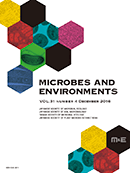
MICROBES AND ENVIRONMENTS
Pioneering Research on Microbes and Their Ecological RolesMICROBES AND ENVIRONMENTS is a prominent academic journal dedicated to advancing the field of microbial ecology, published by the Japanese Society of Microbial Ecology. Since its inception in 1996, the journal has provided a vital platform for disseminating innovative research and insights into the intricate relationships between microbes and their environments. With an impressive impact factor reflected in its Q2 rankings across multiple categories, including Ecology, Evolution, Behavior and Systematics, Medicine, Plant Science, and Soil Science, MICROBES AND ENVIRONMENTS is acknowledged as a significant contributor within the ecological and biological sciences community. The journal’s content, which spans over two decades of cutting-edge research, supports researchers, professionals, and students in enhancing their understanding of microbial functions and their critical roles in various ecosystems. The journal does not operate under an open access model, ensuring that submissions undergo a rigorous peer-review process that upholds its reputation for quality. Engage with MICROBES AND ENVIRONMENTS to explore the ever-evolving landscape of microbial research and its implications for environmental sustainability and public health.
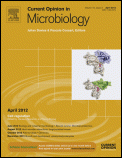
CURRENT OPINION IN MICROBIOLOGY
Elevating understanding in the dynamic world of microbes.CURRENT OPINION IN MICROBIOLOGY is a prestigious academic journal published by CURRENT BIOLOGY LTD, dedicated to advancing the field of microbiology through timely and insightful reviews. With an ISSN of 1369-5274 and an e-ISSN of 1879-0364, this journal has established itself as a leading source of knowledge in various subfields, consistently achieving a Q1 ranking in Infectious Diseases and Microbiology for 2023. Operating from the United Kingdom, CURRENT OPINION IN MICROBIOLOGY serves a critical role for researchers, clinicians, and students alike by disseminating groundbreaking findings and fostering discussions that shape the future of microbiological research. The journal's rigorous selection process ensures that only high-quality articles are published, reflecting its strong impact factor and high percentile rankings across relevant Scopus categories. Although it does not follow an open-access model, its comprehensive scope and valuable contributions to the medical and scientific community underscore its importance as an essential resource for advancing our understanding of microbial sciences.
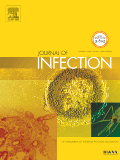
JOURNAL OF INFECTION
Connecting Researchers and Clinicians in Infection ScienceJOURNAL OF INFECTION is a premier academic publication in the fields of infectious diseases and medical microbiology, published by W B SAUNDERS CO LTD. With a profound impact factor and established since 1979, this journal serves as a crucial resource for researchers, clinicians, and policy-makers seeking to advance knowledge and understanding of infectious processes and their management. The JOURNAL OF INFECTION holds an impressive position in the academic hierarchy as reflected by its Q1 quartile rankings in both Infectious Diseases and Microbiology (medical) for 2023, further underscored by its Scopus rankings: #2 in Medical Microbiology and #5 in Medical Infectious Diseases, placing it in the 98th percentile overall. While the journal does not offer Open Access options, it provides a comprehensive outlet for innovative research, reviews, and clinical insights that drive the field forward. Published from the United Kingdom, it attracts a global readership keen on staying at the forefront of infectious disease research, making it an essential addition to any academic and clinical library.

Frontiers in Microbiology
Fostering Knowledge in the World of MicrobiologyFrontiers in Microbiology is a leading open-access journal published by Frontiers Media SA, available since 2010, and based in Switzerland. As a prominent platform for innovative research, it specializes in microbiology and medical microbiology, marked by its impressive Q1 classification in the respective fields, reflecting its significant impact and relevance in advancing microbial sciences. With a Scopus ranking of 49th in Microbiology and 41st in Medical Microbiology, this journal is positioned among the top-tier publications, catering to a diverse audience of researchers, professionals, and students. The journal aims to disseminate groundbreaking findings and foster discussions that drive the field forward, ensuring a comprehensive coverage of microbiological studies, from basic research to applications in healthcare and beyond. Enjoy unrestricted access to cutting-edge articles that contribute to both theoretical and applied aspects of microbiology, enriching the scientific community's knowledge base.
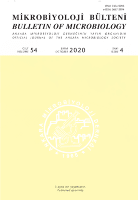
MIKROBIYOLOJI BULTENI
Connecting Researchers in Microbiology and Infectious DiseasesMIKROBIYOLOJI BULTENI, with ISSN 0374-9096, is a prestigious academic journal published by the ANKARA MICROBIOLOGY SOC, located in Ankara, Turkey. Established in 1973, this journal has been a vital conduit for disseminating research in the fields of Immunology, Microbiology, and Infectious Diseases, garnering a reputation as a significant contributor to the scientific community. The journal is currently ranked in the Q3 category within Immunology and Microbiology (miscellaneous), and Infectious Diseases, indicating its impactful presence amidst contemporary research. With access options that may be restricted, MIKROBIYOLOJI BULTENI actively welcomes submissions that advance the understanding of critical microbiological principles and practices, thereby supporting both national and international research efforts. Researchers, professionals, and students are encouraged to explore the latest findings shared in this journal, as it continually shapes the landscape of microbiology and infectious disease studies through its comprehensive and rigorous peer-reviewed publications.
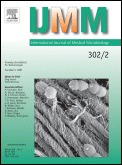
INTERNATIONAL JOURNAL OF MEDICAL MICROBIOLOGY
Transforming Microbiology into Actionable Health SolutionsWelcome to the International Journal of Medical Microbiology, a leading publication in the field of microbiological research and infectious diseases, offered by Elsevier GmbH. Established in 2000, this esteemed journal provides a scholarly platform for the presentation of high-quality research, reviews, and innovations that bridge medical microbiology and clinical applications. With an impressive impact factor positioning it within the Q1 category across multiple disciplines, including Infectious Diseases, Microbiology, and Medicine, the journal is recognized for its rigorous peer-review process and significant contributions to advancing our understanding of microbial pathogenesis, diagnostics, and therapeutics. The International Journal of Medical Microbiology is committed to open access, promoting the dissemination of knowledge and accessibility for researchers, professionals, and students worldwide. Based in Munich, Germany, the journal continues to play a vital role in the global scientific community, fostering collaborations and inspiring future innovations in the fight against infectious diseases.

mLife
Advancing microbial knowledge for a sustainable future.Welcome to mLife, an emerging journal at the forefront of microbiological research published by the esteemed WILEY in China. With its ISSN 2097-1699 and E-ISSN 2770-100X, mLife serves as a vital platform for scholars and practitioners aiming to advance their understanding of microbial sciences. With an impressive Q2 ranking in the Microbiology category and a Scopus rank of 143 out of 182, mLife is quickly establishing itself as a valuable source of cutting-edge research. The journal, covering a range of innovative topics from immunology to environmental microbiology, provides an engaging venue for disseminating high-quality research findings aimed at addressing real-world challenges. Authors and readers alike benefit from its accessibility features that encourage scholarly collaboration and information sharing. As we converge on the rich microbial landscapes from 2022 to 2024, mLife is committed to fostering a community dedicated to rigorous research and impactful discoveries.

Microbiology Research
Transforming Microbiology Through Open Access KnowledgeMicrobiology Research, published by MDPI, stands as a pivotal open-access journal in the field of microbiology, having established its presence since 2010. Based in Switzerland, this journal strives to provide a platform for innovative research and cutting-edge findings in various branches of microbiology, including medical microbiology and molecular biology. With an impact factor that reflects its dedication to scholarly excellence, Microbiology Research is classified in the Q3 category for both microbiology and medical microbiology, and Q4 for molecular biology as of 2023, indicating its growing importance and outreach within these domains. The journal aims to foster discussion and collaboration among researchers, professionals, and students by presenting articles that cover a wide array of topics and methodologies in microbiological research. Leveraging its open-access model, Microbiology Research ensures that high-quality research is accessible to a global audience, thus facilitating the advancement of knowledge and innovation in the microbial sciences.

BRAZILIAN JOURNAL OF MICROBIOLOGY
Exploring the Microbial World for a Healthier TomorrowThe BRAZILIAN JOURNAL OF MICROBIOLOGY, published by SPRINGER, stands as a pivotal platform in the field of microbiology, offering an open access model since 2000. With the ISSN 1517-8382 and E-ISSN 1678-4405, this esteemed journal encourages the dissemination of groundbreaking research and innovative methodologies that contribute to the understanding of microbial life, its role in health and disease, and its environmental impact. Based in Switzerland and accessible globally, the journal’s categorization in the Q3 quartile for Microbiology reflects its commitment to quality and relevance in the scientific community. As of 2023, it ranks 121 out of 182 in the Scopus listings for Microbiology, further highlighting its growing influence in immunology and microbiological research. With converged years spanning from 1992 to 2024, the journal continues to support a diverse range of studies, making it an invaluable resource for researchers, professionals, and students alike.